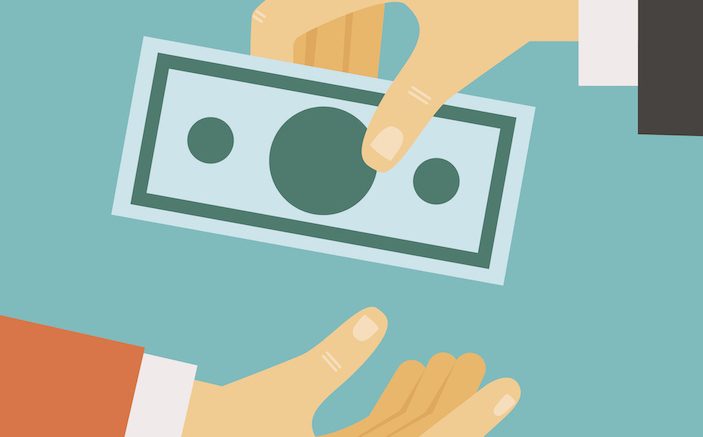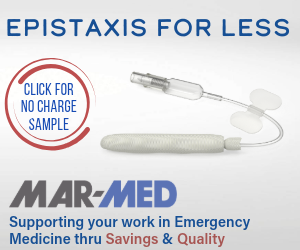A box of donuts for Christmas? Huzzah! But what about a couple of crisp hundred dollar bills? Where do you draw the line on holiday handouts?
Last week you saw a chronically ill child in the ED you have taken care of several times before. Tonight, as you come in to start your shift, there is an envelope addressed to you sitting by your computer. Inside is a thank you note, a little drawing by the child, and a $100 gift card to a local restaurant. Is it alright to accept it? A little research on your part reveals no formal policy on gifts at your institution. What do you think you should do?
Professional guidelines are not going to help you out very much in this situation. The AMA and ACP policies are vague on receiving gifts from patients. From a nursing perspective, the ANA guideline is similarly vague although a bit more negative. Instituting a “no gifts” policy could certainly get you out of this dilemma, but you’d risk hurting the patient’s feelings. After all, gifts can make the giver feel good about themselves, or foster positive feelings about the caregiver-patient relationship. Or a patient may come from a culture where the giving of gifts is normal and expected and refusing is considered rude. The positive act of giving may be therapeutic for some patients. Tokens of appreciation are common and many are benign. So a “No Gifts” policy may be a bit too strong.
On the other hand, not all gifts are benign. Some patients may expect something in return such as extra attention, influence, special access or jumping ahead in line. Taking a gift from a patient may cause you to treat them differently.
The ACP states that small gifts are acceptable. Physicians are warned to consider the motivation behind the gift. The nature of the gift should also be considered (a box of doughnuts for the nurse’s station is very different than a nightgown, for instance). Would the gift affect objectivity or create a conflict of interest? The AMA ethics guideline offers the following as a criterion: would you be comfortable if your colleagues or the public knew about this gift?
Timing is another consideration. Lots of people give gifts during the holidays. On the other hand, what is the meaning of a gift given out of the blue? If you have taken care of this patient before and no gift was given, why are they giving it now?
Is the gift simply too extravagant? That’s going to be subjective, unfortunately. From some families, a $100 gift card is a small token, for others it would be a larger statement.
One great option at the holidays if you anticipate receiving gifts is to direct the thankful party to make a donation to the hospital in your name. Academic medical centers rely on philanthropy to support their various clinical, educational and research enterprises. Physicians are not generally trained in philanthropy. A study looked at physicians’ perspective on grateful patient philanthropy at Johns Hopkins. Twenty physicians who had been the stimulus for multiple grateful patient donations were interviewed in depth about their thoughts on patient philanthropy. 80% felt comfortable discussing philanthropy with their patients. Four themes emerged from the interviews. The most frequent was concern about the impact of donations on the doctor-patient relationship. Another was that this activity was beyond the physician’s professional role. Interviewees raised concern about fairness and unequal treatment of donors versus regular patients. They also raised concerns about potentially taking advantage of vulnerable patients. Interestingly, the majority of the physicians interviewed said they personally had no ethical issues in promoting philanthropy despite raising these concerns. There seemed to be recognition of the ethical pitfalls but a sense that “this doesn’t affect me”.
Academic institutions need donations, but soliciting and accepting these may not be harmless. VIP programs claim simply to add additional niceties to typical care. However, it may be difficult to ask sensitive questions or perform embarrassing or uncomfortable exams or procedures with VIP patients. So are they really getting your usual care, something more or something less?
So back to our crisp $100 bill. What to do with it? Saying no to all gifts seems negative and unnecessary, yet big gifts – even philanthropy – can raise ethical concerns if strings are attached. Unfortunately the answer is murky: Trust your gut. Is the gift a little too large? Is the timing suspect? Does it make you uncomfortable? If any warning bells go off, trust your instincts and tell the patient that you are grateful but cannot accept it. In this situation, your conscience may be your best guideline available.






1 Comment
Interesting points on accepting gifts from patients. While some physicians might feel it can influence the value of care and relationship, I look at simple gifts as an appreciation to strengthen the physician-patient bond and not an any form of bribe or what. As patient myself, I also give some gifts for doctors and nurses who really took care of me or my family members. It could be a simple letter, a piece of chocolate or a pen. It can ease their stress or it can inspire them all day and be extra motivated to serve other patients.